|
|
|
Sort Order |
|
|
|
Items / Page
|
|
|
|
|
|
|
| Srl | Item |
| 1 |
ID:
164904
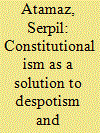

|
|
|
|
|
| Summary/Abstract |
This article contributes to the growing scholarship on the connections between the Ottoman and Iranian revolutions by exploring Ottomans’ reactions to and portrayal of the constitutional struggle in Iran. Based on an examination of primary sources that have not been utilized before, it reveals how an ideologically diverse group of intellectuals tried to link the two revolutions together in the Ottoman-Turkish press, focusing on shared problems and ideals. It demonstrates that undergoing a revolutionary process themselves, these intellectuals interpreted the events in Iran through the prism of their own experiences and used them to garner support for the constitutional regime at home. Through their depictions of the Iranian revolution, they not only portrayed the 1908 Revolution as part of a broader struggle against despotism and imperialism with significant implications for the Islamic world, but also conveyed the message that the Ottoman constitution needed to be supported and protected so that it did not fail like the one in Iran.
|
|
|
|
|
|
|
|
|
|
|
|
|
|
|
|
| 2 |
ID:
161193


|
|
|
|
|
| Summary/Abstract |
In the aftermath of the First World War, British officials had difficulty understanding the elusive forces behind the Anatolian resistance movement. They anxiously assumed that Kemalists were being controlled by the Unionist leaders in exile and that they were part of an international conspiracy. In this confusion, the fugitive Unionist leaders received disproportionate attention and credit in British intelligence reports, with critical consequences for their political sense-making and decision-making. I argue that the preconception of ‘Young Turks’ in general as well as assumptions about Unionist leaders’ alleged and actual activities after 1918 were crucial for British officialdom's policies towards the Anatolian resistance movement.
|
|
|
|
|
|
|
|
|
|
|
|
|
|
|
|
| 3 |
ID:
165737
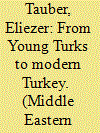

|
|
|
|
|
| Summary/Abstract |
Mustafa Kemal Atatürk, founder of modern Turkey, was one of the early leaders of the Young Turk movement. Nevertheless, when he founded modern Turkey as a nation-state he pushed the veterans of the Young Turks aside, as their pan-Turanian ideology no longer suited the basics of the new state. The leaders of the Young Turks represented the past and their perceptions no longer corresponded with the change of circumstances and the new objects of the nascent state. While Armenian activists assassinated some of the top leaders of the Young Turks as a revenge for the Armenian genocide, second-rank leaders had now to find their way in modern Turkey. Aziz Bey was one of the seniors of the Ottoman security system during the Young Turks period and eventually reached the most senior position of director of the Ottoman General Security Service. When modern Turkey emerged, because of his remarkable talents, he managed to fit in middle-level positions in the new state (province governor, mayor and MP), but never regained elite status.
|
|
|
|
|
|
|
|
|
|
|
|
|
|
|
|
| 4 |
ID:
192260
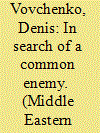

|
|
|
|
|
| Summary/Abstract |
The uneasy Putin-Erdogan partnership reminds of the early twentieth-century trends in the Russo-Turkish relations – taking advantage of each other’s dissidents vs cooperating against Western imperialism. Imperial Russia tended to indulge in the former which undermined the latter tendency in its policies in regards to the Young Turk regime who were similarly making irredentist overtures to Russian Muslim minorities. Both sides were also tempted or constrained by their existing or potential Great Power allies. In contrast, the partnership between the Soviets and Mustafa Kemal Ataturk would be more consistent as they minimized meddling in each other’s internal affairs to jointly oppose European encroachments. This article also shines a new archival light on the motivations of the Soviet side while highlighting the less well-known opposition to close cooperation between traditional rival empires on all levels of Soviet leadership. There is no scholarly work focusing on the 1908–1923 period in a single monograph or article (from the Young Turk revolution to the Lausanne negotiations). Looking at both sides of the 1917 divide reveals surprising continuity between the imperial and the Soviet policies despite the earthshattering effects of the First World War.
|
|
|
|
|
|
|
|
|
|
|
|
|
|
|
|
| 5 |
ID:
128214
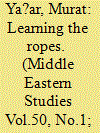

|
|
|
|
|
| Publication |
2014.
|
| Summary/Abstract |
This article analyses the topoi of the Young Turk reading of the 1905 Russian Revolution. It argues that the Young Turks considered the 1905 Revolution as a victory against autocratic regimes and as an edificatory example for the Ottoman constitutionalists. This example provided the Young Turks with a mirror in which they saw a model of revolution from below. As such, in addition to encouraging the Young Turks to formulate and re-assess their methods and means of establishing a constitutional regime in the Ottoman Empire, the 1905 Revolution helped them to transform their initially intellectual movement to an effectual political one.
|
|
|
|
|
|
|
|
|
|
|
|
|
|
|
|
| 6 |
ID:
158372
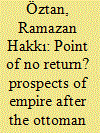

|
|
|
|
|
| Summary/Abstract |
In late 1912, the Ottoman imperial armies suffered a series of quick defeats at the hands of the Balkan League, comprising Greece, Serbia, Bulgaria, and Montenegro, resulting in significant territorial losses. The Ottoman defeat in the Balkan Wars (1912–13) often stands at the center of teleological accounts of a neat and linear transition from Ottoman Empire to Turkish Republic. These teleological readings see the Ottoman defeat as a historical turning point when Ottoman elites turned nationalist, discovered Anatolia, and embraced the Turkish core. This article contends that such approaches frame late Ottoman history in anticipation of the later reality of nation-states, and overlook the messy and historically complex nature of the collapse of empire and the emergence of the nation-state. Although the defeat was certainly shocking for the Ottoman ruling elite, I argue that it initiated an era of debate rather than one of broad consensus. Similarly, the defeat neither marked the end of the Ottoman Empire nor heralded the coming of the Turkish Republic, but rather reinvigorated the Ottoman imperialist project.
|
|
|
|
|
|
|
|
|
|
|
|
|
|
|
|
| 7 |
ID:
182866
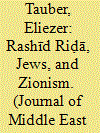

|
|
|
|
|
| Summary/Abstract |
Muhammad Rashīd Riḍā was one of the most prominent religious scholars of Sunni Islam in the first third of the twentieth century, a reformer who sought to rehabilitate the Muslim world by means of a return to its origins, a strategy later followed by the Muslim Brotherhood and other fundamentalist movements. This article deals with a lesser-known aspect of Riḍā’s thought – his evolving attitude toward the Jewish settlement in Palestine and the Zionist movement. It began with appreciation if not admiration, continued in attempts at cooperation (in the face of common enemies and in general), and ended with anti-Semitic remarks and unequivocal religious rulings (fatwās) against the Zionist enterprise. All the same, even when Riḍā came to believe that the Zionist movement was an enemy that had to be fought, he still appreciated its abilities and continued to hold that Arabs and Muslims should take it as a role model both in fighting it and in general.
|
|
|
|
|
|
|
|
|
|
|
|
|
|
|
|
| 8 |
ID:
192271
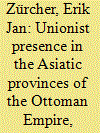

|
|
|
|
|
| Summary/Abstract |
This article investigates the way the Young Turk Committee of Union and Progress, which was essentially an organisation with roots in the European provinces of the Ottoman Empire and in the Western Anatolian province of Aydın, established itself in the provincial centres of Eastern Anatolia and the Arab provinces after the revolution of July 1908. It then seeks out the patterns that can be discerned in the composition of the local branches, and in the relationships of these branches with the committee’s centre (first in Salonica, then in Constantinople) on the one hand, and with the local Muslim elites and non-Muslim communities on the other.
|
|
|
|
|
|
|
|
|
|
|
|
|
|
|
|
| 9 |
ID:
168367
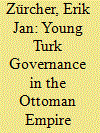

|
|
|
|
|
| Summary/Abstract |
The article analyses the system of government of the Ottoman Empire during the First World War by looking at three elements: the constitutional-parliamentarian monarchy, the Committee of Union and Progress and the army. The analysis takes place along two axes: one in which the functioning of, and the power relations between, the different institutional elements are analysed, and one based on a series of case studies of important decision-making moments of the years 1914–18.
The civil-military relations as they developed during the war years are studies in a comparative framework. The Ottoman situation is analysed against the backdrop of changes in the balance of power between military and civilian authorities in other belligerent countries in Europe.
|
|
|
|
|
|
|
|
|
|
|
|
|
|
|
|
| 10 |
ID:
164900
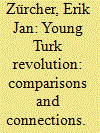

|
|
|
|
|
| Summary/Abstract |
This article consists of a comparative analysis on the one hand, and an attempt to trace influences and connections, on the other. In the comparative part, it seeks to determine the place of the Ottoman constitutional revolution of July 1908 in the global wave of revolutions in the decade before the First World War. It accepts that there is a high degree of similarity in the liberal constitutionalist ideology of the revolutionary movements, but emphasizes the differences in the social bases of the revolutionary movements. In the part on connections, the influences on the Young Turks' ideology, organisation and revolutionary methodology are traced, as well as the influence they exerted on other revolutionary movements.
|
|
|
|
|
|
|
|
|
|
|
|
|
|
|
|
|
|
|
|
|